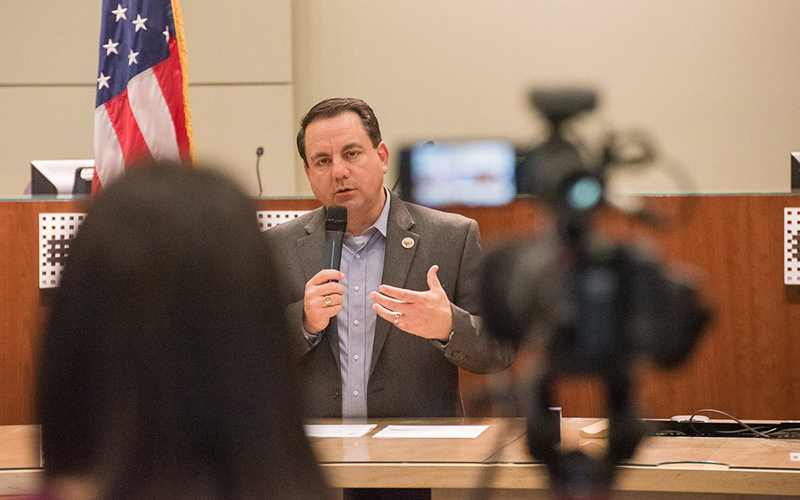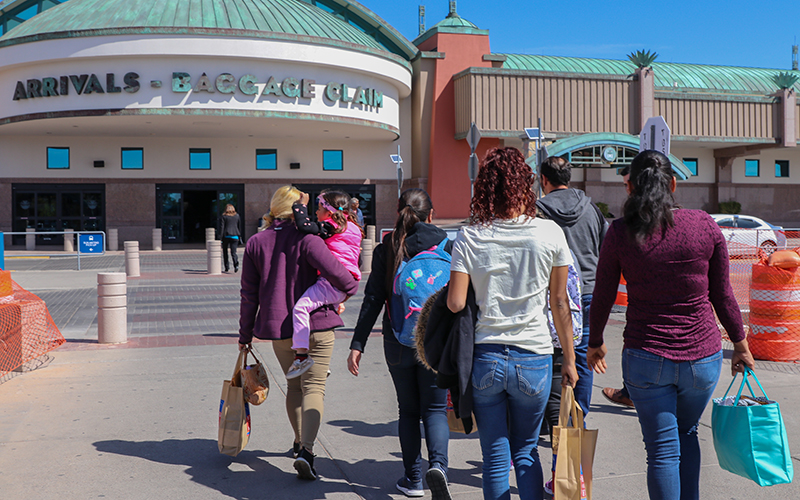
Some migrants must wait days before their families are able to purchase bus tickets or flights for them. With what little belongings they have, often just donations from the church, they arrive at El Paso International Airport. (Photo by Julian Hernandez/Cronkite News)
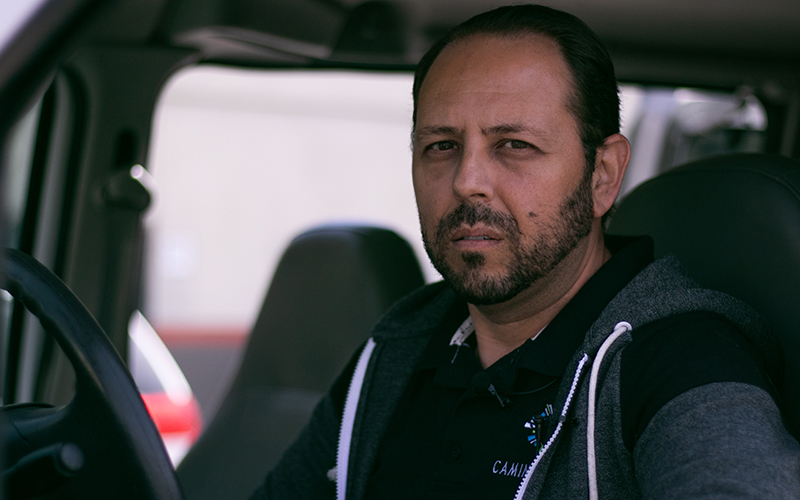
With a shortage of volunteers and drivers, Israel Cabrera, associate pastor of the Caminos de Vida Church in El Paso, transports migrants temporarily housed in his church to their flights and buses. (Photo by Julian Hernandez/Cronkite News)
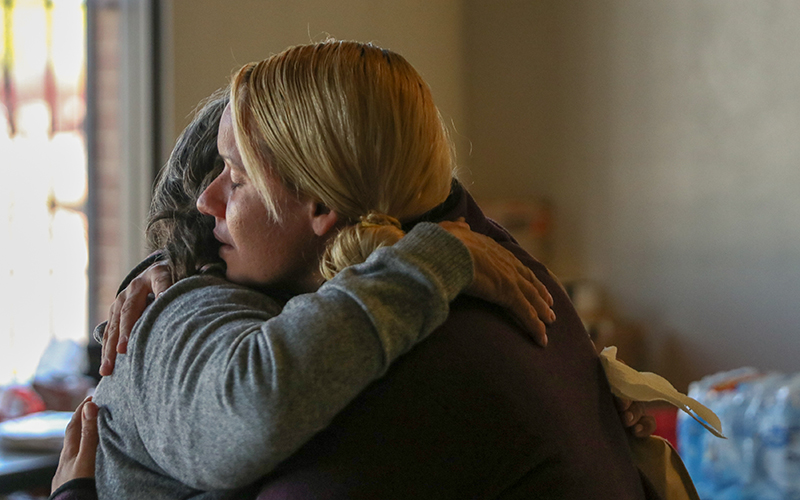
After a week in El Paso and a couple of nights at the Caminos de Vida Church, volunteer Rosario Ramirez shares a final embrace with Lesbia Isela Castillo Funes (right) before Funes departs to join family in Chicago. (Photo by Julian Hernandez/Cronkite News)
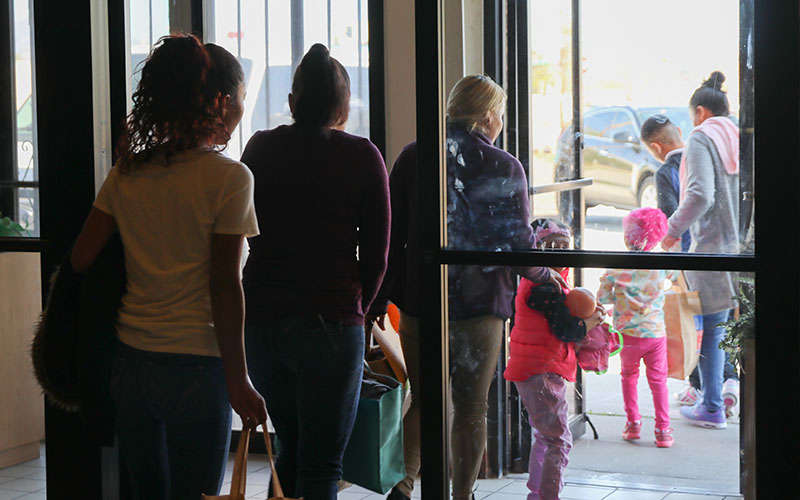
After many days in border patrol custody and at the church, migrants get ready to depart to their final destinations, often with family across the country. Funes and her daughter (center) will head to Chicago as they await their initial immigration court hearing. (Photo by Julian Hernandez/Cronkite News)
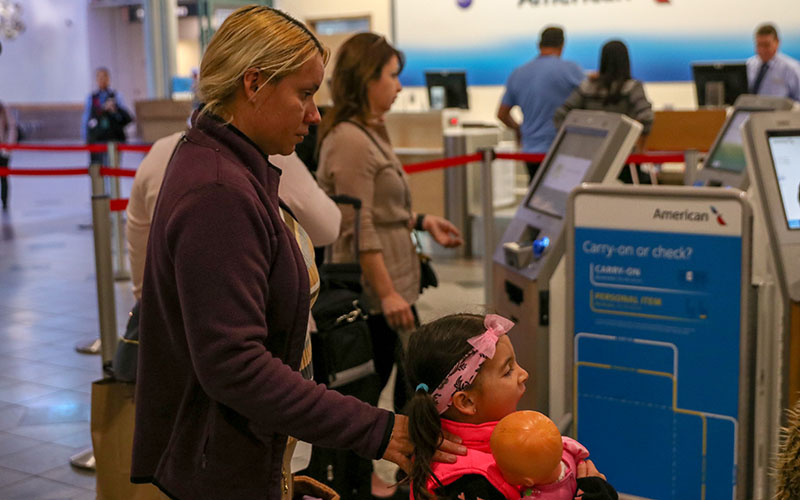
Funes and her 5-year-old daughter Jancey were dropped off at El Paso International Airport by the church. They’re headed to Chicago, where they will join family, and are excited to put their experience in detention behind them. (Photo by Julian Hernandez/Cronkite News)
EL PASO – On any night in El Paso, there are volunteers and residents scouting the streets for stranded migrants in need of assistance after being recently released by Immigration and Customs Enforcement or Customs and Border Protection.
Doris Reimer is one of those El Paso residents who has taken to the streets in recent weeks. Reimer began her scouting missions once she saw images of the migrants detained by CBP underneath the Paso del Norte International Bridge that crosses the U.S.-Mexico border.
On a cool, spring Sunday night dipping in the lower 50s, Reimer set out on her search and made a stop at the Greyhound bus station in downtown El Paso. “I can’t travel across to Mexico, but I can see the area here and I remembered that on the news they were talking about the Greyhound buses. So, I came here,” Reimer said.
It is at the sidewalk adjacent to the Greyhound station that Reimer comes across a group of 12 adults and nine children recently released by ICE.
“Apparently ICE just dropped them here, but they don’t have tickets or any confirmation numbers,” Reimer said.
For many years, once migrants were processed and given a date for when they are to appear in an immigration court, ICE would transport groups of migrants to local bus stations. In the past, Greyhound allowed ICE to drop off migrants directly inside their stations, but crowding has forced Greyhound to reverse their stance on the practice.
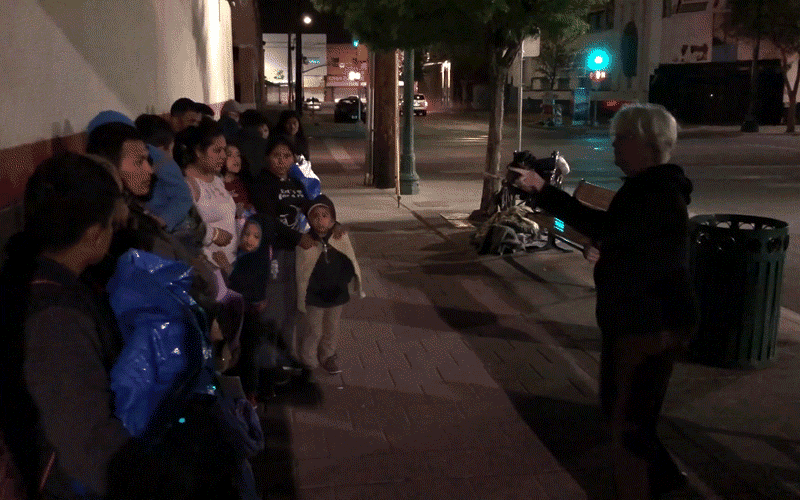
With no phones or any way to communicate with their families, migrants are left stranded on the El Paso streets. Doris Reimer, right, assist them in calling their families and connecting them with local shelters. (Video by Julian Hernandez/Cronkite News)
Many migrants who are dropped off at the local stations often have no way of contacting their families or purchasing a ticket, effectively leaving them stranded.
According to migrants who spoke with Cronkite News outside the Greyhound station and at the Caminos de Vida Church in El Paso, CBP officers seized their cell phones during processing, leaving them without any way to contact their families.
During CBP inspections, officers have the authority to search and seize electronic devices as part of their law enforcement operations.
“I’ve been able to let them use my phone so they can make contact with their families. We’re hoping that they can get tickets through their families,” Reimer said.
The migrants find themselves in a situation where they don’t have a ticket, they don’t speak English and don’t have a way to contact their families. They also don’t have appropriate clothing on to keep themselves warm, with the foil space blankets provided to them by CBP during their detention being all they have. “One little girl has a short sleeved shirt on wrapped in her foil blanket,” Reimer said.
“The supervisor inside asked that they leave the building. I went back inside and asked if they could please go back inside, since it’s so cold outside. For the kids it’s cold and they didn’t want to allow that without them having tickets,” Reimer said.
Knowing that the migrants often have no supplies or appropriate clothing for the cool El Paso nights, Reimer puts together supply kits for them. “I brought some bags that have tarps, and socks and a little bit of food in each bag. But I don’t think everyone got one though, because I only brought 11 bags and there’s 19 of them.”
While Reimer can help the migrants contact their families and temporarily quell their hunger with snacks, she cannot shelter them or provide them with any more resources than the small kits she can afford to prepare.
For shelter and help purchasing tickets, Reimer contacts Annunciation House, one of the El Paso based nonprofit organizations that help migrants and refugees in the area.
Annunciation House operates its own shelters, but also works with local churches and other organizations in El Paso and New Mexico, creating a network of temporary shelters for the migrants.
In connecting the migrants with Annunciation House, Reimer said she believes she “plays her part” and that it’s the right thing to do.
“We’re all brothers and sisters. We’re all children of God,” Reimer said as she fought back tears and pointed out a car parking near the group of migrants. “I think this might be the help: Annunciation House. I’m going to go over.”
While ICE works with Annunciation House to coordinate the dropoff and transportation of migrants to shelters, the organization sometimes receives calls directly from residents like Reimer, sending the organization scrambling to find last minute resources.
In an April 1 press conference, executive director of Annunciation House Ruben Garcia said ICE continues to communicate with the organization every night to deliver an estimate on the number of migrants that will be released the following day.
Garcia said the numbers are updated in the morning and he then responds to ICE to “please take so many to this hospitality site, so many to this other hospitality site and that’s the way it has worked.” Garcia said the number of migrants being released has steadily increased from 200 a day to a high of 750 migrants released in a single day.
In a March 27 press conference, CBP Commissioner Kevin K. McAleenan confirmed that CBP was directly releasing migrants instead of transferring them to ICE for detention and subsequent release. “For the first time in over a decade, CBP is performing direct releases of migrants when ICE is unable to provide bed space to relieve overcrowding,” McAleenan said.
Since that operational shift was made, Annunciation House has struggled to adapt to the changes.
The coordination system between CBP, ICE, local churches and organizations is stretched to its limit and has put a strain on organizations both in Arizona and El Paso.
“Frankly, ICE is very good at how they release people and, more importantly, ICE seems to have the transportation network to be able to transport people out of El Paso into Albuquerque and to Las Cruces,” Garcia said.
Local organizations in El Paso are now housing the large share of all migrants families coming through the El Paso area with hundreds of families processed each week.
For Israel Cabrera, an associate pastor at the Caminos de Vida church in southeast El Paso that began housing and assisting migrants earlier this year, the probability of being asked to house migrants on short notice is a constant reality for his church.
“We’re just contacted by the coordinator and he’ll just let us know how many are coming out today and then he just tells us how many each center will receive,” Cabrera said. “We’ve actually received over 700 immigrants over the last five weeks.”
In the past weeks, Cabrera said ICE can drop off as many as 100 migrants in a single day at the church, with some of them coming at night.
“The time windows will be very broad, from 11 a.m. to 11 p.m. One of the groups that are here with us, we received them at 11 p.m.,” Cabrera said.
That poses a challenge for the church. Their facilities have no shower and feeding so many people late at night means makeshift meals if no volunteers are available to help cook.
“We have to take them the next morning to shower, but we need to get them fed and some water and prepared to go to sleep.”
For the migrant families who make up the overwhelming majority of those who pass through Caminos de Vida, they’re grateful to have a warm and safe place to sleep after their long journeys and their detentions at CBP and ICE facilities.
Lesbia Castillo, 28, traveled from Honduras with her 5-year-old daughter Jancey and was part of a group of migrants released to Caminos de Vida who had spent several nights in the temporary detention area underneath the Paso del Norte International bridge.
“We spent five days sleeping on top of the rocks,” Castillo said in Spanish. She said there were no beds or cots made available to them. As they slept underneath the bridge, temperatures dropped to as low as 55 degrees on March 25, with only the space blankets to keep them warm.
Castillo said she made the journey to the United States with her daughter because the “situation in my country isn’t very good.”
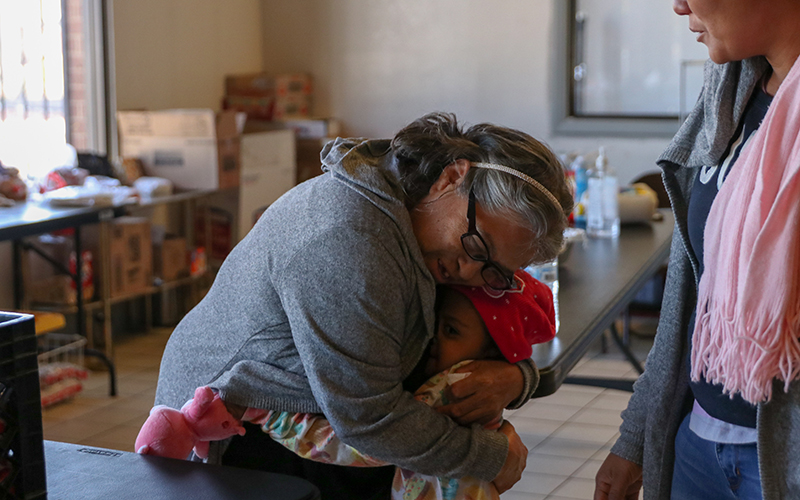
Rosario Ramirez has been attending Caminos de Vida Church for over a decade and volunteers in assisting the pastor in cooking for the migrants. Ramirez provides what comfort she can to all who pass through the church doors. (Photo by Julian Hernandez/Cronkite News)
While migrants coming from Central America are leaving impoverished countries with few economic opportunities, many of them are also fleeing from violence. Guatemala, Honduras and El Salvador are among the countries with the highest homicide rates in the world, according to United Nations Office on Drugs and Crime statistics from 2016.
Henry Maez, 17, spent over a week traveling from central Guatemala by bus with his father. Maez said he spent four nights underneath the Paso del Norte International Bridge and didn’t get much sleep as he was kept up by the cold weather. Maez also said his region of Guatemala had seen an increase in violence in recent years.
While Castillo and Maez added they were thankful for Caminos de Vida sheltering and feeding them, Cabrera said some migrants who arrive at the church are suspicious and weary of the church’s motives.
“One of the groups, they were actually very afraid of us, thinking that we were being ingenuine,” Cabrera explained. “They would say, ‘Why are you being so nice?’ They thought that we would take them to work somewhere or do something else.”
So it’s up to Cabrera and his group of volunteers to make the migrants feel as comfortable as possible in the temporary home until their date of departure arrives.
Volunteers like 68-year-old Rosario Ramirez help comfort the migrants when they arrive at the church. Ramirez has been attending the Caminos de Vida church for about a decade and has lived in El Paso for nearly 30 years.
Ramirez was born in the north-central Mexican state of Zacatejas and immigrated to the United States many decades ago.
“I know how painful it is to leave your country, your family,” Ramirez said.
When Caminos de Vida decided it would start housing migrants, Ramirez began volunteering as a cook to help feed the dozens of migrants temporarily living at the church. Ramirez also spends time with the young children in the shelter comforting them and playing with them.
On a Monday afternoon, Cabrera announces it’s time for those with a flight and bus ride in the next two hours to pack up and prepare to leave very soon. Almost all of the migrants can fit their belongings into a single bag.
As Cabrera calls for everyone to start heading outside to the van, everyone begins to line up for their final goodbye and warm embrace with Ramirez.
For most of the migrants, they’ll spend a couple of nights at the church before they board a plane or bus to head to their families across the country.
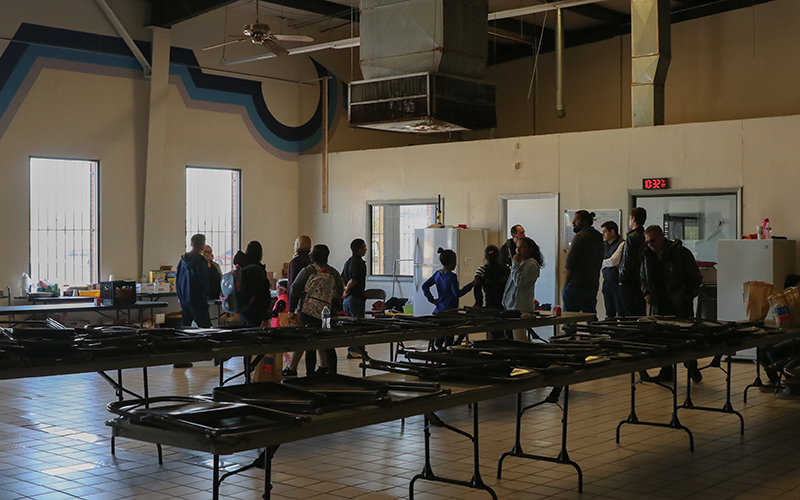
Inside the church, Caminos de Vida Pastor Israel Cabrera discusses flight and bus departures with migrants. Their destinations are across the United States. (Photo by Julian Hernandez/Cronkite News)
Cabrera said his church does not have the capacity to shelter the migrants for more than a few days, so it is largely up to Monica Cabrera, Israel’s sister, to assist migrants and their families in purchasing their travel tickets and organize all of their travel documents. But the task is made difficult with a lack of documents to identify the migrants, other than the documents CBP and ICE provide, which Israel Cabrera said often contains spelling errors.
“It’s a piece of paper with all of their information and a black and white picture of themselves which will be like a passport for them here in the United States. So it’s a document that allows them to travel. It the only form of ID they have,” Cabrera said.
When the departure date arrives for the migrants, Monica and Israel Cabrera carefully put together an envelope with all their crucial documents, assist them with checking into their flights and buses, but the rest is out of their hands.
“We don’t just drop them off. We walk in with them, help them print out their confirmation tickets and get them on their way,” Israel said. “We give them a manila folder and we write on there, ‘I need help. I don’t speak English. Spanish only,’ and that helps a lot,” Cabrera said.
Cabrera said when they hold up the manila, someone who speaks Spanish often helps them out. “That’s been a huge help, because most of the time they don’t even know what to do or where to go,” Cabrera said.
At El Paso International Airport, Cabrera checks the travelers in one by one at a kiosk, hands them their tickets and offers them some final words of advice and prayers as they moved toward the security gate.
For Castillo and her daughter, the day couldn’t have arrived sooner. She hopes to move on from the experience. “Thanks to God were are finally here and what happened in the past stays in the past,” Castillo said.
But as she prepares to pass through security, she wonders if she can entirely forget the ordeal.
“This has left a mark on our lives, on our minds and at times we suffered for our children, in search of something better for them.”
Video by Austin Westfall/Cronkite News
Follow us on Instagram.
AlertMe
